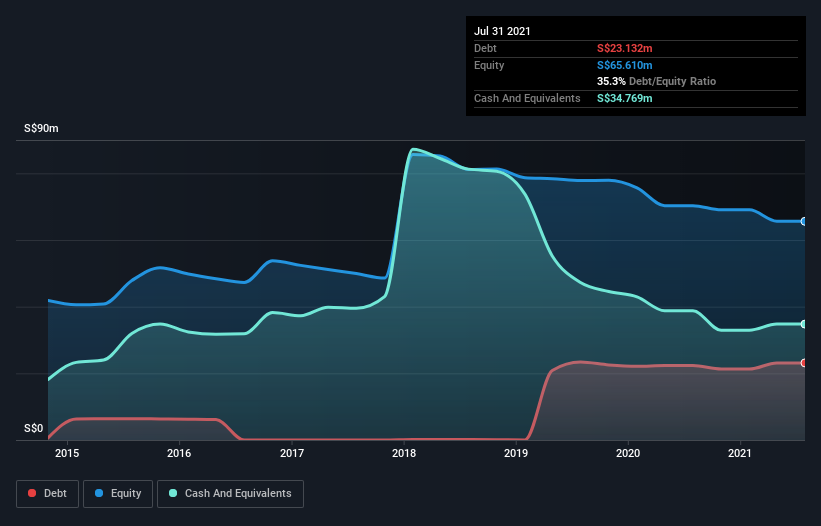- Singapore
- /
- Hospitality
- /
- SGX:BKW
Datapulse Technology (SGX:BKW) Has Debt But No Earnings; Should You Worry?
David Iben put it well when he said, 'Volatility is not a risk we care about. What we care about is avoiding the permanent loss of capital.' So it might be obvious that you need to consider debt, when you think about how risky any given stock is, because too much debt can sink a company. We can see that Datapulse Technology Limited (SGX:BKW) does use debt in its business. But should shareholders be worried about its use of debt?
What Risk Does Debt Bring?
Generally speaking, debt only becomes a real problem when a company can't easily pay it off, either by raising capital or with its own cash flow. If things get really bad, the lenders can take control of the business. However, a more frequent (but still costly) occurrence is where a company must issue shares at bargain-basement prices, permanently diluting shareholders, just to shore up its balance sheet. By replacing dilution, though, debt can be an extremely good tool for businesses that need capital to invest in growth at high rates of return. When we think about a company's use of debt, we first look at cash and debt together.
See our latest analysis for Datapulse Technology
What Is Datapulse Technology's Net Debt?
As you can see below, Datapulse Technology had S$23.1m of debt, at July 2021, which is about the same as the year before. You can click the chart for greater detail. But it also has S$34.8m in cash to offset that, meaning it has S$11.6m net cash.

How Healthy Is Datapulse Technology's Balance Sheet?
Zooming in on the latest balance sheet data, we can see that Datapulse Technology had liabilities of S$22.6m due within 12 months and liabilities of S$1.96m due beyond that. Offsetting these obligations, it had cash of S$34.8m as well as receivables valued at S$450.0k due within 12 months. So it actually has S$10.7m more liquid assets than total liabilities.
This surplus liquidity suggests that Datapulse Technology's balance sheet could take a hit just as well as Homer Simpson's head can take a punch. With this in mind one could posit that its balance sheet means the company is able to handle some adversity. Simply put, the fact that Datapulse Technology has more cash than debt is arguably a good indication that it can manage its debt safely. The balance sheet is clearly the area to focus on when you are analysing debt. But it is Datapulse Technology's earnings that will influence how the balance sheet holds up in the future. So if you're keen to discover more about its earnings, it might be worth checking out this graph of its long term earnings trend.
In the last year Datapulse Technology had a loss before interest and tax, and actually shrunk its revenue by 62%, to S$1.0m. To be frank that doesn't bode well.
So How Risky Is Datapulse Technology?
Statistically speaking companies that lose money are riskier than those that make money. And we do note that Datapulse Technology had an earnings before interest and tax (EBIT) loss, over the last year. Indeed, in that time it burnt through S$3.9m of cash and made a loss of S$3.7m. With only S$11.6m on the balance sheet, it would appear that its going to need to raise capital again soon. Even though its balance sheet seems sufficiently liquid, debt always makes us a little nervous if a company doesn't produce free cash flow regularly. When analysing debt levels, the balance sheet is the obvious place to start. However, not all investment risk resides within the balance sheet - far from it. For example Datapulse Technology has 3 warning signs (and 2 which don't sit too well with us) we think you should know about.
Of course, if you're the type of investor who prefers buying stocks without the burden of debt, then don't hesitate to discover our exclusive list of net cash growth stocks, today.
New: Manage All Your Stock Portfolios in One Place
We've created the ultimate portfolio companion for stock investors, and it's free.
• Connect an unlimited number of Portfolios and see your total in one currency
• Be alerted to new Warning Signs or Risks via email or mobile
• Track the Fair Value of your stocks
This article by Simply Wall St is general in nature. We provide commentary based on historical data and analyst forecasts only using an unbiased methodology and our articles are not intended to be financial advice. It does not constitute a recommendation to buy or sell any stock, and does not take account of your objectives, or your financial situation. We aim to bring you long-term focused analysis driven by fundamental data. Note that our analysis may not factor in the latest price-sensitive company announcements or qualitative material. Simply Wall St has no position in any stocks mentioned.
Have feedback on this article? Concerned about the content? Get in touch with us directly. Alternatively, email editorial-team (at) simplywallst.com.
About SGX:BKW
Datapulse Technology
An investment holding company, engages in the hotel and hospitality property investment business in South Korea and Singapore.
Flawless balance sheet with slight risk.
Market Insights
Community Narratives


Recently Updated Narratives


MINISO's fair value is projected at 26.69 with an anticipated PE ratio shift of 20x


Fiverr International will transform the freelance industry with AI-powered growth

Constellation Energy Dividends and Growth
Popular Narratives


MicroVision will explode future revenue by 380.37% with a vision towards success


NVDA: Expanding AI Demand Will Drive Major Data Center Investments Through 2026



